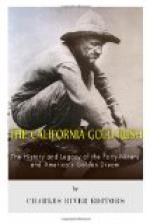[6: Linn, The Story of the Mormons, 406.]
This friendly condition could not, of course, long obtain. Brigham Young’s policy of segregation was absolutely opposed to permanent friendly relations. The immigrants on the other hand were violently prejudiced against the Mormon faith. The valley of the Salt Lake seemed to be just the psychological point for the breaking up into fragments of the larger companies that had crossed the plains. The division of property on these separations sometimes involved a considerable amount of difficulty. The disputants often applied to the Mormon courts for decision. Somebody was sure to become dissatisfied and to accuse the courts of undue influence. Rebellion against the decision brought upon them the full force of civil power. For contempt of court they were most severely fined. The fields of the Mormons were imperfectly fenced; the cattle of the immigrants were very numerous. Trespass cases brought heavy remuneration, the value being so much greater for damages than in the States that it often looked to the stranger like an injustice. A protest would be taken before a bishop who charged costs for his decision. An unreasonable prejudice against the Mormons often arose from these causes. On the other hand there is no doubt that the immigrants often had right on their side. Not only were the Mormons human beings, with the usual qualities of love of gain and desire to take advantage of their situation; but, further, they belonged to a sect that fostered the belief that they were superior to the rest of mankind, and that it was actually meritorious to “spoil the Philistines.”
Many gold-diggers who started out with a complete outfit finished their journey almost on foot. Some five hundred of these people got together later in California and compared notes. Finally they drew up a series of affidavits to be sent back home. A petition was presented to Congress charging that many immigrants had been murdered by the Mormons; that, when members of the Mormon community became dissatisfied and tried to leave, they were subdued and killed; that a two per cent tax on the property was levied on those immigrants compelled to stay through the winter; that justice was impossible to obtain in the Mormon courts; that immigrants’ mail was opened and destroyed; and that all Mormons were at best treasonable in sentiment. Later the breach between the Mormons and the Americans became more marked, until it culminated in the atrocious Mountain Meadows massacre, which




